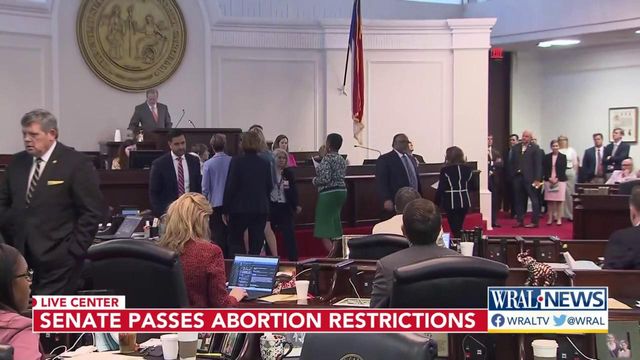NC Senate approves 12-week abortion ban, setting up veto test of new GOP supermajority
Two days after being introduced, the GOP-controlled state Senate approved the bill to ban most abortions after 12 weeks of pregnancy. The measure now goes to Democratic Gov. Roy Cooper, who says he'll veto the measure.
Posted — UpdatedNorth Carolina Republicans' fast-tracked proposal for a new 12-week abortion ban cleared the Senate Thursday, setting the stage for the first test of the GOP’s new supermajority.
“This is a mainstream commonsense bill,” Republican Sen. Joyce Krawiec, a lead sponsor of the bill, said during floor debate Thursday. “... This is a pro-life plan. Not an abortion ban.”
Democrats, doctors and abortion groups said the bill goes further than that, pointing to new hoops women would need to jump through to get an abortion, including a mandatory in-person conversation with a doctor at least 72 hours before an abortion and a follow-up visit days after the initial visit.
“There are 20 counties in the state that don’t have a hospital and 30 that don’t have an obstetrician," said Sen. Sydney Batch, D-Wake. "So, how exactly is a working mom of two children, who works at a fast food restaurant … how is she supposed to take three days off from work over the course of a week to get to a doctors office 75 miles away in order to obtain an abortion?"
The chamber passed the bill 29-20 along party lines after about five hours of debate, and over protests from Democrats who denounced the speed with which the complex measure – introduced less than 48 hours before – sailed through the legislature.
Gov. Roy Cooper has promised a veto, but Republicans seem to have the numbers to override him. The state constitution gives Cooper 10 days to veto the bill and send it back to the General Assembly, so it may be law before the end of the month. Many of the provisions would be effective July 1, though that could be delayed by lawsuits.
All 20 Senate Democrats spoke for their maximum allotted 10 minutes during Wednesday's floor debate. They also tried a series of parliamentary maneuvers to delay the vote, which the Republican supermajority rejected.
Debate was often emotional Thursday. Democratic and Republican women told personal stories of their pregnancies and other events that shaped their beliefs.
One of the most emotional moments came from Sen. Val Applewhite, a Fayetteville Democrat and Air Force veteran. She told the story of when she was 18, newly enlisted, and narrowly escaped being raped by a high-ranking officer. She never reported it, she said, adding that many women don’t report such crimes out of a legitimate fear of retribution.
So while the bill does keep the deadline for rape victims to get an abortion at 20 weeks, Applewhite said, that realistically won't apply to the thousands of women stationed at North Carolina's many military bases.
"We are not going to say we were raped, because there are consequences to telling people that you were raped," Applewhite said, fighting back tears. "So you try to find someone that knows how to help you in the civilian world, to terminate a pregnancy that you did not ask for. And it happens more often than you all would know."
It was clear, on many occasions in the hours-long debate, that the two sides simply disagree on basic issues surrounding abortion.
“Abortion is not the solution to the challenges that women face," said Sen. Amy Galey, R-Alamance. "It is a tragic and irreversible act of violence.”
“When do you Democrats say that life begins?" Galely said. "Abortion in the third trimester is not just between a woman and her doctor. There is a baby involved."
"The consequences will also be deadly," she said.
Batch said the bill enforces a narrow view of morality and represents "an extreme and oppressive step backwards."
Sen. Mike Woodard, D-Durham, said wealthy women in the state "will always have access to reproductive health care but millions of low-income women will be forced to give birth."
Quick passage
It advanced so quickly that numerous Senate lawmakers, including one of its main sponsors, were not familiar with all the bill's details as they debated it.
Sen. Joyce Krawiec, R-Forsyth, struggled at times to delineate between new requirements in the bill and existing ones in state law.
“This is a 46-page bill,” Krawiec said, as Wake County Democratic Sen. Jay Chaudhuri questioned her on details. “I read it yesterday, as you did, and I don’t remember all parts of it.”
Hundreds of protestors rallied outside the General Assembly for the House vote Wednesday, and a smaller group was at the building for Thursday's Senate vote. At one point a spectator in the Senate gallery shouted “Abortion rights now! Democracy now! Decorum now! Decorum now! Where’s the decorum?” from the gallery before being escorted out of the chamber.
Abortion opponents attended, too, and praised the passage, though some had pushed for a six-week ban because most abortions occur before the 12-week mark.
“Passage of the 'Care for Women, Children and Families Act' marks the end of North Carolina as a destination for abortion and is a historic step forward for unborn babies and their mothers," NC Values Coalition Executive Director Tami Fitzgerald said in a statement after the Senate vote. "We applaud the General Assembly for taking this courageous first step in protecting life for the unborn and providing care for pregnant women in hard circumstances."
Democrats had already predicted this bill wouldn't be the end of new abortion restrictions from the legislature's Republican majority, saying they fear incremental changes. Speaker of the House Tim Moore said Tuesday, after the House vote, that he didn’t expect further abortion legislation during this legislative biennium, which lasts through 2024.
North Carolina will elect a new governor, and a new state legislature, in November 2024, and abortion will likely be a major issue in those elections. Republicans have a narrow supermajority in both chambers now, allowing them to pass bills over Cooper's veto only if they all stick together. Passing laws would become much easier with a Republican governor.
Bill provisions
Current North Carolina law bans abortions after 20 weeks pregnancy, except in medical emergencies.
Senate Bill 20 moves that to 12 weeks, with some exceptions. In cases of rape or incest, abortion would be allowed through 20 weeks of pregnancy. Bill sponsors said there's no requirement to report rape or incest to police, a woman simply needs to tell the doctor. But Democrats said physicians are required by another law to report the rape of a minor to police.
Abortion would be legal under this bill through 24 weeks pregnancy if the fetus has a “life-limiting anomaly." It would stay legal at any time if a doctor declares a medical emergency, but Democrats complained this exemption is too vague and will leave doctors questioning whether they'll face punishment if they perform a medically needed abortion.
The bill doesn’t include criminal penalties for women who get an abortion outside the allowed time frames, but doctors who provide one could face a $5,000 fine and the possibility of losing their license.
The bill also contains a number of provisions changing the process for an abortions, requiring more in person visits and a number of new forms to be signed. Doctors must also collect more information about an abortion and report it to the state. The N.C. Medical Society, which represents doctors in the state, called the measure "administratively burdensome" and said it "proposes a complex set of regulations that are not evidence-based and will impede patient access to medical care."
The bill also includes more state funding for adoption services, maternal health programs. And it expands paid leave for state government employees, giving mothers eight weeks off after they give birth, and fathers and adoptive parents four weeks after a child arrives.
Questions remained after the Senate vote about just what the bill will require of the state's 14 abortion clinics. Kraviec and other bill sponsors said several times they will have to come up to state standards for ambulatory surgery centers. Planned Parenthood, which runs six clinics in North Carolina, said none of its clinics meet those standards now and that the bill was intended to shut clinics down.
But the bill seems to say a state commission, appointed by the governor, will need to write new standards, and that they can be "no stricter" than the rules for ambulatory surgical centers.
Sen. Natalie Murdock, D-Durham, was near tears on the Senate floor Thursday, describing her fear and uncertainty over the bill.
"Horrified," she said. "Horrified at the prospect of having a child in my home state."
Republicans pushed back when Democrats said the bill strips hard-fought freedoms away from women. Abortion has gone from "safe, legal and rare," once a rallying cry for abortion rights groups, to “convenient and available at any point," Sen. Lisa Barnes said.
“The opponents will tell us that abortion is healthcare," Kraviec said. "There are two patients involved in an abortion and it’s the only procedure that I’m aware of that’s considered successful when one of the patients dies.”
Democratic filibuster, Republican math
Senate Democrats sought to delay Thursday's vote through several procedural maneuvers.
One pointed to a state law that says appropriations bills — the bill deals with $180 million in state funds — may not pass until the state budget has passed, which hasn't happened this year. Senate Republicans ruled the effort out of order, noting that the abortion bill contains language exempting the bill from that law.
Senate Republican leader Phil Berger's office said the debate was the Senate's longest in a decade.
Democrats in both the House and Senate also filed formal protests over the votes under a section of the state constitution that allows lawmakers to dissent "any act or resolve which he may think injurious to the public or to any individual." That hadn't happened in the House since 1963.
Cooper said after the Senate vote that the bill had "nothing to do with making women safer, and everything to do with banning their reproductive freedom." He's promised a veto, but it remains to be seen when that comes down.
After the November elections, Republicans were one seat shy of a veto-proof majority in both chambers. The GOP gained that missing seat last month, when Rep. Tricia Cotham switched parties. She joined Republicans after she said she became disillusioned with the Democratic Party.
Before her switch, Cotham, a longtime abortion-rights advocate, had introduced a measure to expand abortion access in the state. On Wednesday, she voted with her new colleagues in favor of the 12-week ban.
Her support poses a hurdle to Cooper’s veto if all GOP legislators support an expected override vote.
Related Topics
• Credits
Copyright 2024 by Capitol Broadcasting Company. All rights reserved. This material may not be published, broadcast, rewritten or redistributed.






